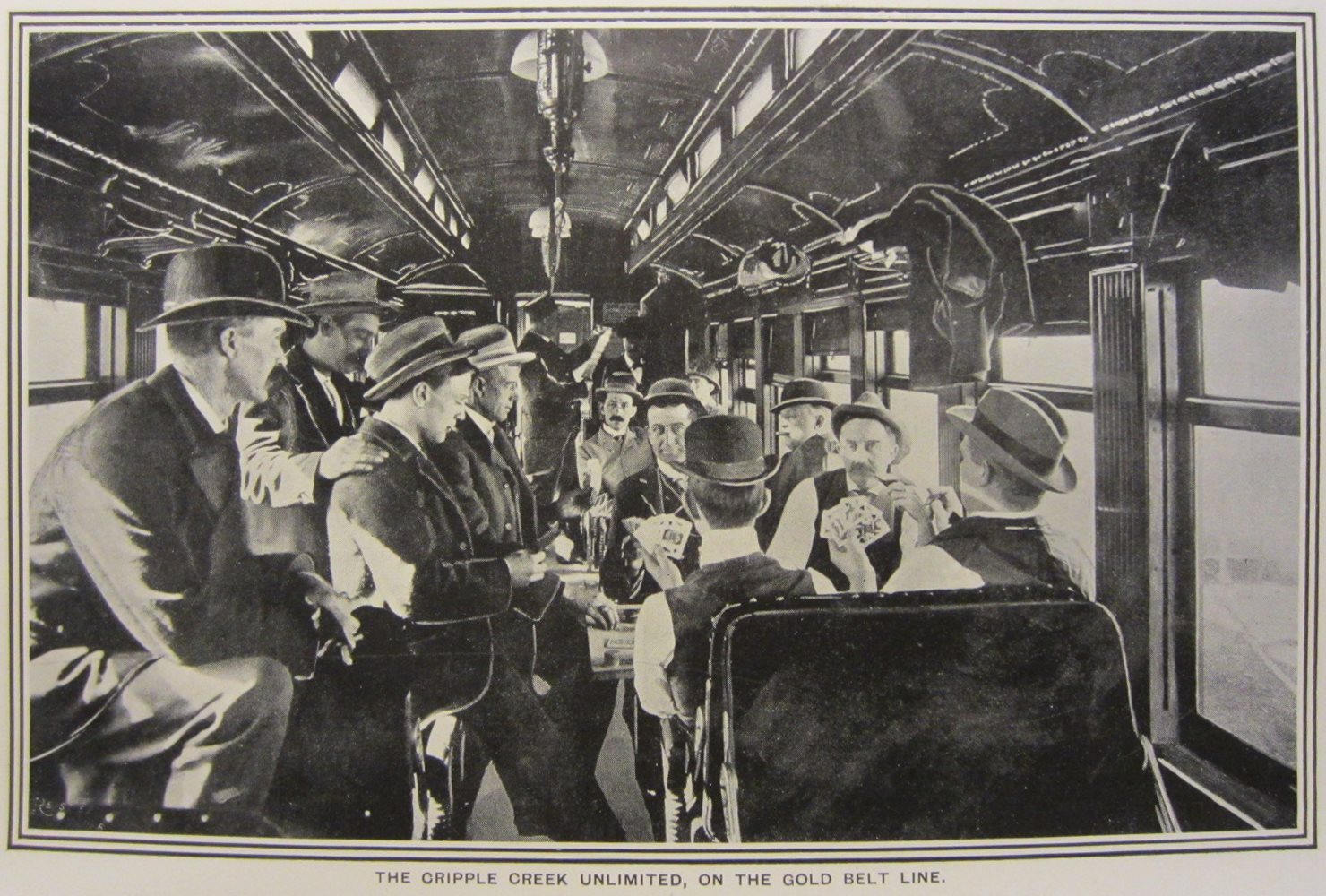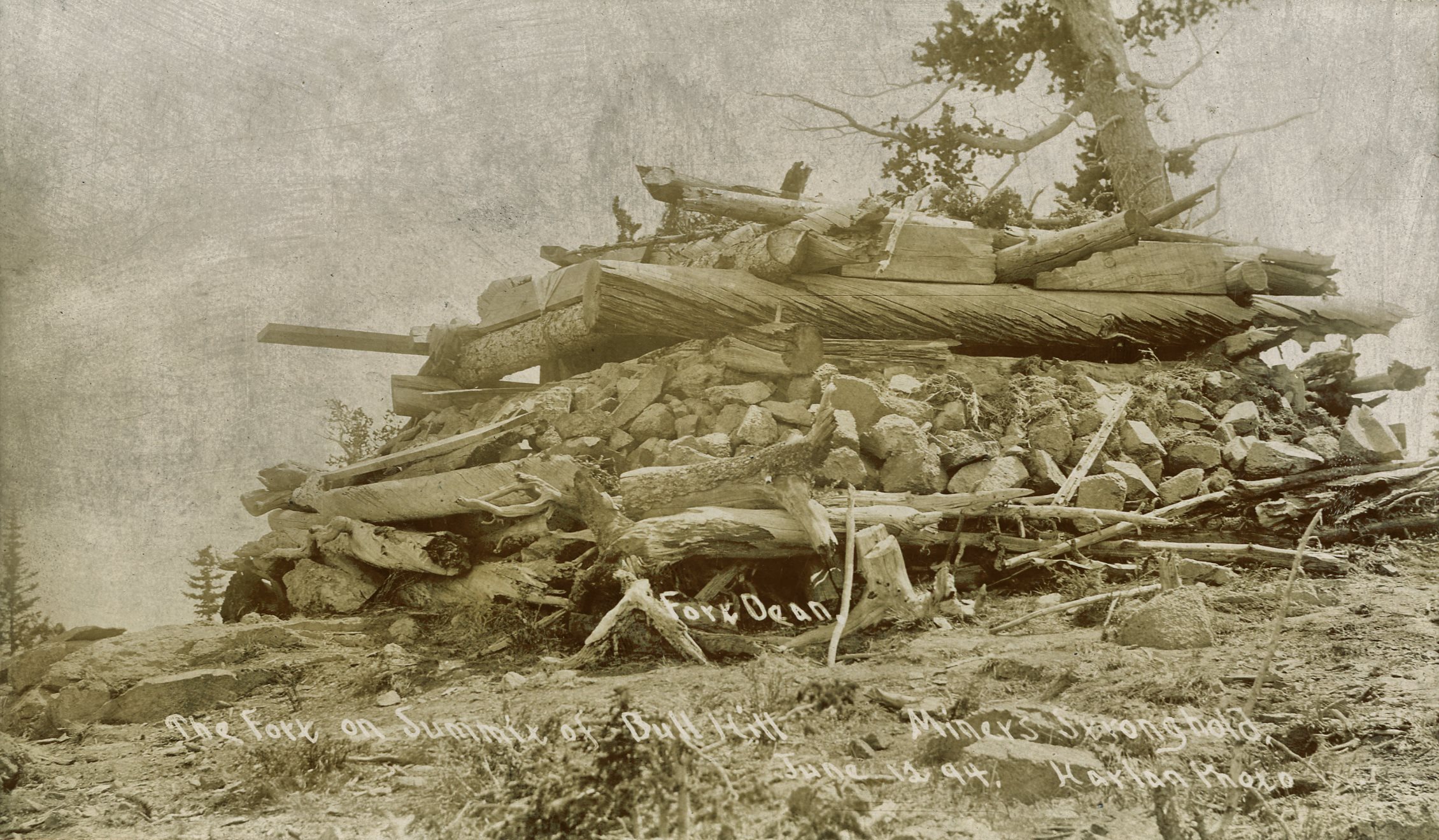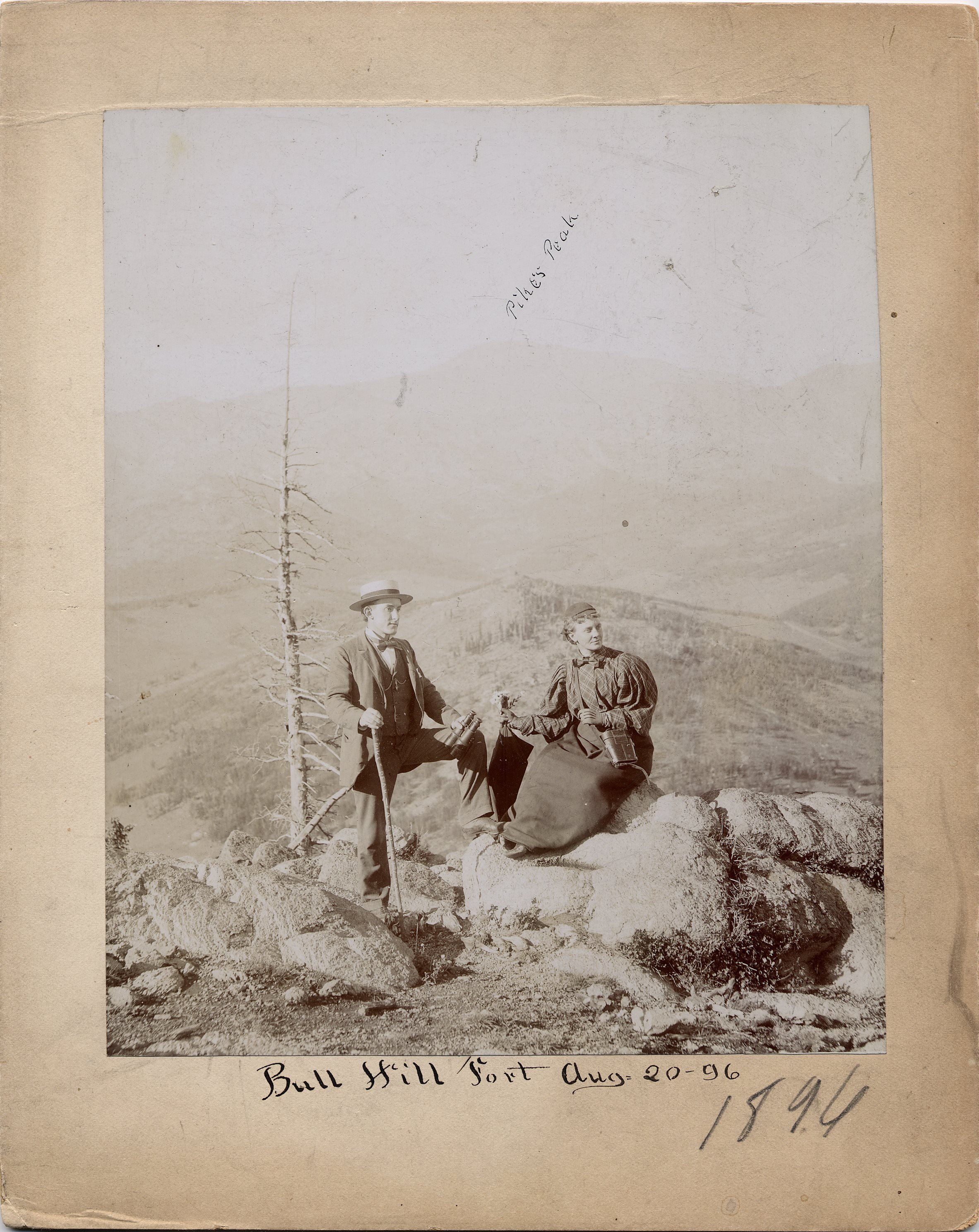-> Found at the Colorado Historic Newspaper site. Or direct to the text on page 1.
Wednesday May 30, 1894.
(page 1)
Source had no images, so I used some images from my collection.
Prospect of a Settlement by Arbitration.
As a result of an attempt by the owners of mines at Cripple Creek to resume work that camp has been the scene of great excitement of late. It has in fact had the appearance of an armed camp. The owners were anxious to begin shipping ore over the new roads that are now within reach of their mines. To do this they realized that they must put non-union men to work and give them an ample guard of deputy sheriffs.
A special train bearing 105 armed men left Denver for Cripple Creek Friday night. It was reported that these men would be made deputy sheriffs and act as guards for some of the large mines, which would start up on a nine-hour schedule.
Most of the men were formerly policemen or firemen under the old fire board.
Great excitement was reported at Cripple Creek. Quite a large force of deputies is said to have been recruited at Cripple Creek. Nobody doubts but that serious trouble is at hand. The miners are as well armed as the guards, and many of them are desperate men.
Friday morning the two guards at the Victor mine were surprised by armed men and made to surrender their guns. They were not harmed. Two men were assaulted at Altman on suspicion of being non-union men.
The Denver deputies arrived over the Florence & Cripple Creek road at 8 o'clock. The party was under command of J. C. Veatch, ex-chief of police of Denver. The men were landed about a mile and a half from Victor.
A number of the men who were sent out as scouts were fired upon by miners and they retired. Some of the men wanted to advance on the mines but this was not thought wise until reinforcements should appear, and at 3:30 the army withdrew from the view of the enemy. The construction train conveyed it toward Florence.
The men camped at Wilbur until reinforcements should arrive.
Orders were sent to Denver for an additional force of guards and County Detective De Lue began to recruit men for service. It was expected that 125 would leave for Cripple Creek Saturday morning.
It was reported that other forces would be enlisted at Colorado Springs, Pueblo and Leadville. One hundred and fifty men were recruited at Colorado Springs Friday afternoon by Sheriff Bowers and sent to Cripple Creek.
The attitude of the state authorities is eagerly studied. Governor Waite returned to Denver Friday and some things that he said showed that he sympathized with the miners as against the deputies.
In response to a request from the governor, Attorney General Engly gave an opinion that the sending of armed men into El Paso from Arapahoe county was in violation of law.
Friday morning a party of masked miners visited the Strong mine where non-union men were at work and ordered the men out. Immediately after the warning had been given two large blasts were placed by the strikers, one in the shaft and the other below the boiler.
A fuse was attached and the people in the neighborhood were told to get away. As the fuse was burning it was discovered that there were 46 boxes of giant powder in the mine, which could be ignited by the blasts. Several of those instrumental in the destruction of the property rushed to the mine and carried the powder to a safe distance.
If it had exploded a portion, if not all, the town of Victor would have been destroyed. The mine property was completely destroyed. The explosion was heard all over the camp. The timbering was blown in all directions, and portions of the boiler were found after all was over several hundred feet away.
Rumors were circulated for a long time after that all the workmen had been killed by the explosion, but this is probably not correct, as some of them were seen to leave the property and go towards Cripple Creek somewhat frightened.
An hour or two later the striking miners, to accentuate their work of destruction, set fire to the shaft house and it burned for over an hour. The army from Denver witnessed the blaze.
Two armed women gained entrance to the bunk-house of the Independence mine and before the eighteen non-union men there knew what was up, made them raise up their hands.
A party of strikers then came in and disarmed the men. They were ordered to go to Cripple Creek and not return.
John Thomas, who was so badly beaten by the strikers Thursday, on the supposition that he was a spy or non-union man, died of his injuries the next day.
The miners have been at work for some time getting ready for a determined attack. The approaches to the mines, which are most bitterly in dispute between the miners and the owners, are guarded in every direction.
Bull mountain, from the top of which miles and miles of country can be scanned, has a strong fortification, composed of logs, rocks and sand. Two hundred men can command all sided, and the capture of the fort would be a dangerous undertaking.
The Victor, Independence, Strong, Pharmacist and other mines are in view. Battle mountain, Little Bull mountain, Grouse mountain and Squaw mountain are all patrolled by miners.
Every one who approaches is examined and questioned, and often times warned of, as in times of war.
The town of Victor of Victor and Altman are in a state bordering on siege. Miners, armed to the teeth, walk the street, some of them fierce, dare-devil looking men, with Winchesters on their shoulders and two revolvers hanging from their belts. Those whom they have reason to be suspicious of are told to go, and the order is generally obeyed.
The miners are firm in their demand, and those who have disobeyed have been severely dealt with. Those who can explain their business are given courteous treatment, but kept at a safe distance from the battle grounds.
The strikers held a meeting at Victor late Friday evening and the suggestion was made that they go down the road and attack the 100 deputies who had withdrawn from town.
This idea was met with favor, and at 2 o'clock 300 men seized a construction train and started in pursuit of the enemy.
When near Wilbur the strikers left the train and moved cautiously forward. The deputies under Veatch had pickets out and they saw the scouts advancing in the early morning light.
The pickets opened fire and gave the alarm. The miners fired in return. They belched forth from all directions. The pickets dropped in behind rocks, the miners following to within forty feet, when they saw their mistake.
Veatch and his lieutenants, Dunnington and Newmeyer, had their men together, and poured forth volley after volley in the air. The miners retreated. Their ruse was not a success.
Seeing this, the Denver contingent assumed the aggressive and gave chase. Slowly and sullenly the miners retreated, firing all the time. The light was bad, however, and the enemy protected by the natural situation.
As they were falling back their leader, Hiram Crowley, fell mortally wounded. A shot pierced his cheek, the bullet passing through the lower part of the neck and fracturing the spinal cord.
All but a few of the miners ceased firing. They assembled around their leader and carried him away.
After Crowley fell most of the miners broke in confusion, making their way for their train. It was at this time that the Veatch forces made a capture of six of the strikers' scouts.
Some three hours after the encounter, the Denver pickets found William Rabideau, one of the deputies, lying cold and dead. He had been shot three times. One of the bullets passed through his heart.
The honors of war were even. Each side had killed one man. John Todd of the miners and ex-Policeman Padget of the Denver army were each slightly wounded.
The deputies sent their prisoners to Colorado Springs.
The miners returned to Victor. They have no idea of giving up the struggle except by force of arms. A muster roll Saturday morning showed 571 bearing Winchesters and probably 100 more with shotguns and other arms.
In the afternoon a report was circulated that 300 men were on the way to capture the mines, and in a few minutes the hills were black with men running to the post to be ready for action. The rumor was false.
It having been reported that three men were entombed in the Strong mine, a party of strikers went down the shaft to investigate. The three men consisting of Sam P. McDonald, the superintendent, Charles Robinson, foreman of the mine, and John Baggett, the engineer, were found uninjured and were brought to the surface.
The moment they were on the surface they were placed under arrest and an armed guard marched them to one of the strikers' lodging houses in town. From there they were marched to the Independence shaft house and on entering the first thing that McDonald saw was a noose suspended from the roof of the bunk house.
An angry crowd of men who had returned with the corpse of their leader from the battle with the Denver deputy sheriffs were determined to lynch McDonald and his two friends.
If it had not been for the guard which had promised them protection, the three men would have been dangling from the rafters in every few minutes. The protection guaranteed them, however was given. They were sent to Altman to be held as hostages for the men the Denver army captured from the strikers.
It was said, however, that if an attack was attempted on the camp, the miners swore that the three prisoners, would quickly dangle from a rope.
Late Saturday afternoon Governor Waite, as commander-in-chief of the state troops, issued an order to the adjutant general to order the First and Second regiments, Colorado National Guard, to report at the different armories as speedily as possible and proceed to Florence.
The next, morning, however, the governor changed his mind, deciding that it was not necessary to send the troops until further hostilities took place.
The first active steps towards arbitrating the differences between the miners and mine owners were taken on Saturday by the labor conference committee of the Colorado Springs trades assembly.
J. J. Hagerman, on behalf of himself and other owners, offered a basis of compromise, and the trades assembly sent a committee to submit it to the miners.
The committee consisted of President Slocum of Colorado College, Rev. E. Evans Carrington, C. Collais, president of the trades assembly, L. W. Bates, president, and C. Geissler, secretary of Colorado Springs carpenter's union, and D. H. Hogan, a member of the same body.
The committee proceeded to Altman Sunday morning. After experiencing some difficulty in getting past the pickets and into the town the committee attended a large meeting of miners which was called by President Calderwood of the Western Federation of miners.
President Slocum explained the errand upon damaged source makes about 5 words unreadable
On behalf of J. J. Hagerman and others, whom he did not name, he made the following offer to the miners:
Eight hours for a day's work, with 20 minutes off for dinner. There would be no arrests nor prosecutions for any acts contrary to law done by the miners and no discrimination against union men in hiring help.
The question of wages would be left to arbitration. It was also proposed to effect an exchange of prisoners between the strikers and the deputies.
The proposition made by Dr. Slocum conceded everything the miners asked for except the question of wages, and he intimated that not much difficulty would be found in disposing of this.
Then the speaker formulated a plan of arbitration on the sole remaining hindrance to resuming work. He proposed that the miners appoint two men to represent them, the mine operators two others, and that these four select a fifth.
To the decision of the quintette should be left the amount which should constitute the pay for a day of seven hours and forty minutes.
Loud applause followed Mr. Slocum's address and he was followed by Rev. Mr. Carrington and other members of the committee.
On motion it was then resolved that the offer of arbitration presented by the delegation be put before a full meeting of the men to be held at 10 a.m. Monday.
When the news that a speedy solution of the strike was in sight spread to Victor, Barry, Cripple Creek and Mound City there was much rejoicing. Everybody accepted it as the beginning of the end. The only difference now left was a question of twenty-five cents in a day's wages and this was regarded as arbitrable.
It may, however, small as it is, delay the final declaration that the fight is over. The miners in Altman said they would accept no reduction. It must be $3 a day and eight hours or nothing.
They believe the bosses will agree to pay the sum in dispute eventually.
The 250 deputies in the vicinity of Florence were sent to Colorado Springs early Sunday morning. From there they were sent over the Midland to Divide, where they went into camp. They will remain there until the result of the attempt at arbitration is known.



